
Thomas Rutling (1854-1915) was an American former slave who became an original member of the Fisk Jubilee Singers, a choral group that toured throughout the United States and Europe. He was a tenor in the group.

Thomas Rutling (1854-1915) was an American former slave who became an original member of the Fisk Jubilee Singers, a choral group that toured throughout the United States and Europe. He was a tenor in the group.
Rutling was born on December 24, 1854, into slavery. His father had either been sold by slavers or had run away before his birth. Rutling was the youngest out of nine children. His mother was sold when he was age three. Rutling never found out the fate of his parents. At age eight, Rutling was put into fieldwork, but his master soon redirected him to household work. In 1865, Union soldiers freed him from slavery.
As a free man, Rutling travelled to Nashville, where his sister taught him to read and write. Rutling then started to work for a surgeon and then enrolled in high school at Fisk University. Thomas paid for his tuition by becoming a waiter for the teachers. He attended the Literary Society's weekly debates, which helped with his linguistic skills.
In 1871, Rutling joined the university's choir as a tenor. They toured across the country to raise funds and spread awareness for Fisk University. The choir was soon named the Fisk Jubilee Singers, since they sang renditions of Negro spirituals.
Rutling spent seven years touring with the Fisk Jubilee Singers in the United States, the United Kingdom and Europe. At the end of that period, he became ill and moved to Switzerland at the end of a tour. He supposedly fathered a son in Austria.
Rutling then returned to England, where he was sponsored as a singer by August Manns, an orchestral director. When public interest in his singing waned, he became a voice teacher at schools in Britain. In 1907, he toured church halls. Rutling published a short autobiography in Bradford and Devon.
Thomas Rutling died on April 26, 1915, at 97 Valley Drive, Harrogate. His death may have been due to liver cancer. Rutling's friends paid for his funeral and plot in Grove Road Cemetery, including the stone cross inscribed "Late Jubilee Singer, Fisk University. They sing the song of the lamb".
Rutling was remembered with love and affection, his impact (mainly in Britain) was significant. He was remembered for his singing, his eloquence, and his role as a representative of the Afro-American arts. [1] [2] [3]
Spirituals is a genre of Christian music that is associated with Black Americans, which merged sub-Saharan African cultural heritage with the experiences of being held in bondage in slavery, at first during the transatlantic slave trade and for centuries afterwards, through the domestic slave trade. Spirituals encompass the "sing songs," work songs, and plantation songs that evolved into the blues and gospel songs in church. In the nineteenth century, the word "spirituals" referred to all these subcategories of folk songs. While they were often rooted in biblical stories, they also described the extreme hardships endured by African Americans who were enslaved from the 17th century until the 1860s, the emancipation altering mainly the nature of slavery for many. Many new derivative music genres emerged from the spirituals songcraft.

Fisk University is a private historically black liberal arts college in Nashville, Tennessee. It was founded in 1866 and its 40-acre (16 ha) campus is a historic district listed on the National Register of Historic Places.
Jubilee quartets were popular African-American religious musical groups in the first half of the 20th century. The name derives from the Fisk Jubilee Singers, a group of singers organized by George L. White at Fisk University in 1871 to sing Negro spirituals. The members of the original Fisk Jubilee Quartet (1909–1916) were Alfred G. King, James A. Myers, Noah W. Ryder, and John W. Work II. Students at other historically black schools, such as Hampton Institute, Tuskegee Institute and Wilberforce University, followed suit. Many independent jubilee troupes also found inspiration in the Fisk Jubilee Singers, such as the Original Nashville Students.
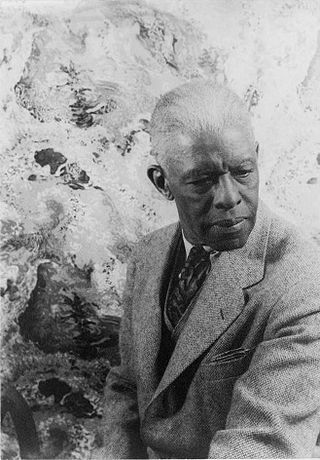
Roland Wiltse Hayes was an American lyric tenor and composer. Critics lauded his abilities and linguistic skills demonstrated with songs in French, German, and Italian. Hayes's predecessors as well-known African-American concert artists including Sissieretta Jones and Marie Selika were not recorded. Along with Marian Anderson and Paul Robeson, Hayes was one of the first to break this barrier in the classical repertoire when in 1939 he recorded with Columbia.
John Wesley Work III was a composer, educator, choral director, musicologist and scholar of African-American folklore and music.
The Fisk Jubilee Singers are an African-American a cappella ensemble, consisting of students at Fisk University. The first group was organized in 1871 to tour and raise funds for college. Their early repertoire consisted mostly of traditional spirituals, but included some songs by Stephen Foster. The original group toured along the Underground Railroad path in the United States, as well as performing in England and Europe. Later 19th-century groups also toured in Europe.

"Wade in the Water" is an African American jubilee song, a spiritual—in reference to a genre of music "created and first sung by African Americans in slavery." The lyrics to "Wade in the Water" were first co-published in 1901 in New Jubilee Songs as Sung by the Fisk Jubilee Singers by Frederick J. Work and his brother, John Wesley Work Jr., an educator at the historically black college in Nashville, Tennessee, Fisk University. Work Jr. (1871–1925)—who is also known as John Work II—spent thirty years collecting, promoting, and reviving the songcraft of the original Fisk Jubilee Singers, which included being a member and director of the Fisk Jubilee Quartet. The Sunset Four Jubilee Singers made the first commercial recording of "Wade in the Water" in 1925—released by Paramount Records. W. E. B. Du Bois called this genre of songs the Sorrow Songs. "Wade in the Water" is associated with songs of the Underground Railroad.
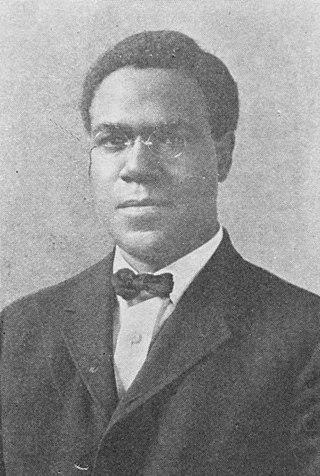
John Wesley Work Jr. was the first African-American collector of folk songs and spirituals, and also a choral director, educationalist and songwriter. He is now sometimes known as John Wesley Work II, to distinguish him from his son, John Wesley Work III.
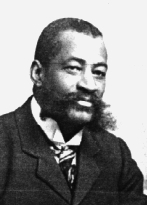
Frederick Jeremiah Loudin was the leader of the Loudin Jubilee Singers. His commanding presence and ambitious personality caused him to emerge as an unofficial spokesperson during the four years he toured with them. He later became internationally famous as the leader of his own brand of Jubilee Singers, the Loudin Jubilee Singers, who toured internationally.
James Dallas Burrus was an American educator, druggist and philanthropist from Tennessee. He and a brother were among the first three graduates of Fisk University, the first African Americans to graduate from a liberal arts college south of the Mason–Dixon line. After completing graduate work in mathematics at Dartmouth College, Burrus became the first professor of mathematics at Fisk University. He later continued his teaching career at Alcorn Agricultural and Mechanical College in Mississippi.
America W. Robinson was an American educator. Robinson was in the first graduating class of Fisk University and sang as a contralto with the Fisk Jubilee Singers. She was the first woman to graduate from Fisk University.
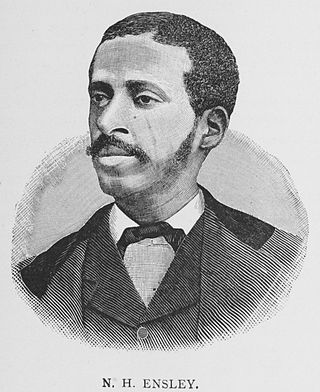
Newell Houston Ensley was an American Baptist minister and civil rights activist. He was a professor at Shaw University, Howard University, and Alcorn University.

Maggie Porter Cole (1853–1942) was a first-generation-freed slave, and she is most notable as an original member of the Fisk Jubilee Singers, one of only four members to participate in all three of the original tours by the group. She was known for her vocal talents as a soprano and also worked as a schoolteacher.

Matthew Washington Kennedy was an American classical pianist, professor, choral director, composer, and arranger of Negro Spirituals. He is widely known as the director of the historic Fisk Jubilee Singers of Nashville, Tennessee from 1957 to 1986.

Ella Sheppard was an American soprano, pianist, composer, and arranger of Negro Spirituals. She was the matriarch of the original Fisk Jubilee Singers of Nashville, Tennessee. She also played the organ and the guitar. Sheppard was a friend and confidante of African-American activists and orators Booker T. Washington and Frederick Douglass.
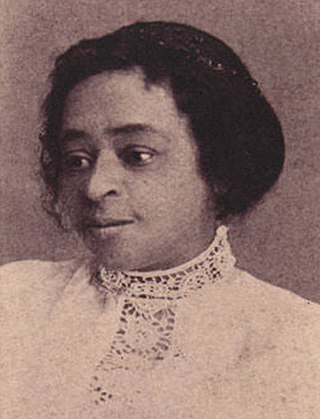
Mary Eliza Walker Crump was an African-American contralto singer and manager, one of the original Fisk Jubilee Singers.
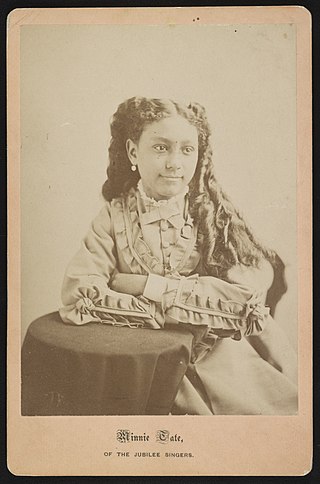
Minnie Tate was the youngest original member of the Fisk Jubilee Singers, based in Nashville, Tennessee.

Jennie Jackson was an American singer and voice teacher. She was one of the original members of the Fisk Jubilee Singers, an African-American a cappella ensemble. She toured with the group from 1871 to 1877. In 1891 she formed her own sextet, the Jennie Jackson Concert Company.
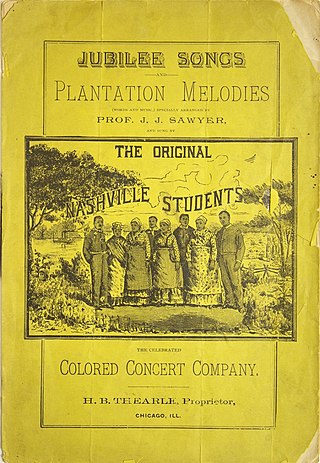
The Original Nashville Students, also referred to as the Original Tennessee Jubilee and Plantation Singers, the Nashville Students, and H. B. Thearle's Nashville Students, were an ensemble of eight or nine African-American jubilee singers. The moniker “jubilee singer” was coined by George White for his a cappella group The Fisk Jubilee Singers. This was primarily a reference to the Jewish year of jubilee described in Leviticus 25. Additionally, jubilation elicits connections with emancipation and liberation, drawing on emotions of nationalist pride from both African American and white audiences. Adopting this title allowed the singers to brand themselves as those who were formerly enslaved, but who had triumphantly risen out of their oppression.
Frederick Jerome Work was a collector, arranger ("harmonizer"), and composer of songs in the United States. He was part of a family of musicians and published a collection of "Negro spirituals" with his brother John Wesley Work.